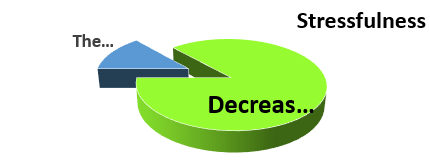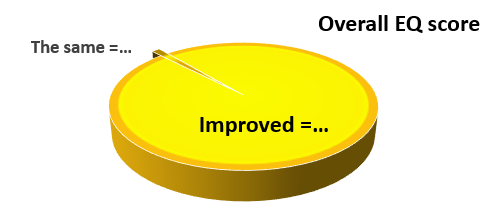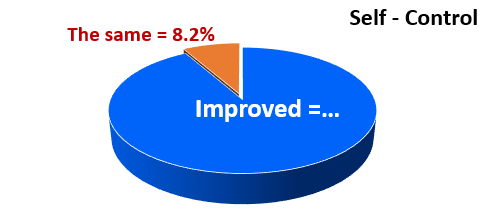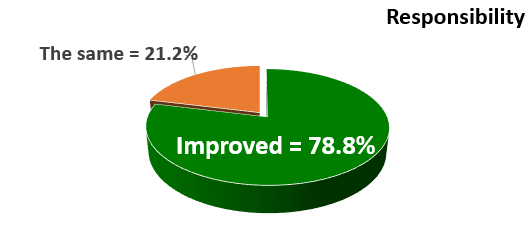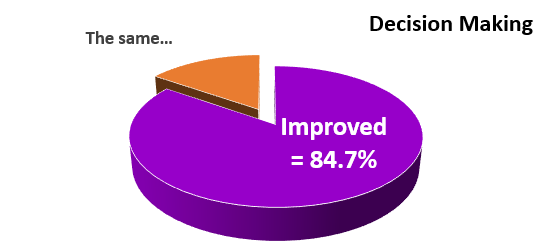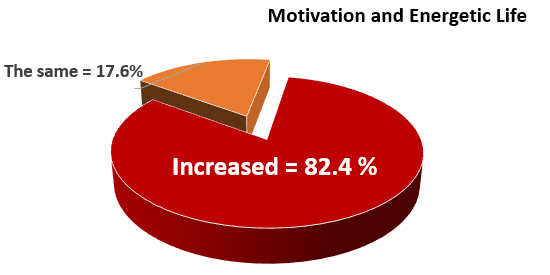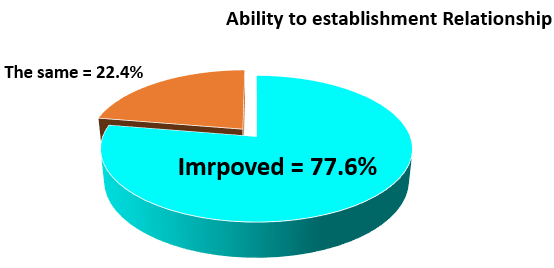ABSTRACT
Background/ Objectives and Goals: Public Health is one of a stressful careers due to high responsible and tremendous of works. In addition, the fast and materialism lifestyle of society also influence their lives. People focus on achievement in different aspects of life rather than keeping body and mind healthy. These increase individual suffering and decrease quality of life. Therefore, the present study focused on awakening public health students to awareness of their spiritual health and have better quality of lives especially having ability to control their own emotions, generate compassion, love, forgiveness and sympathize with others. In addition, improvement of the responsibility to their own lives, works and others.
Methods: Eighty-five Public Health students at Suranaree University of Technology, Thailand participated the 10 weeks spiritual health care workshop with 3 hours/time/ week. All students learned and practiced mindfulness and meditation based on the Buddha teachings in Buddhism. They also learn how the mind work, the ways to control the strong emotions e.g., anger, hatred, desperate, envy, competitive, fear and love. The evaluations were done by using Stress questionnaire and Emotional Quotient (EQ) questionnaire of Department of Mental Health, Ministry of Public Health, Thailand. In addition, we evaluate each student through individual report writing which each one can have more freely express their feeling, attitude, thinking, alteration that occur in the mind and body health, quality of life improvement and transformation.
Results/Conclusion: The findings suggested that approximately 90.6 % of students could decrease their own stress. Strikingly, the overall EQ score revealed that 98.8 % of students improved their EQ ability. The detail of EQ analysis data demonstrated that 91.8% increased the self-control capacity while 83.5 % showed acceleration of sympathy. Moreover, students could incline their responsibility and decision-making skill with 78.8 % and 84.7%, respectively. Furthermore, the data exhibited by 82.4 % of students showed motivation and energetic life improvement. Finally, 77.6 % of students could establishment the relation with themselves and other people. In conclusion, this special workshop has a beneficial effect on mental health which can improve self – improvement and quality of lives the participating public health students. Therefore, this kind of spiritual health care learning activity should be incorporated into the main curriculum study program to make the students having well balanced lives.
Keywords: Public Health; Spiritual Health Care; Emotional Quotient; Stress; responsibility Self-improvement
Introduction
Stress is a condition of the mind that effect both mind and body health. Stress is one of crucial factors causing wide range of human illness [1-3]. Nowadays, society copes with higher statistic of mental illness and suicide due to fast and stressful lifestyle. People focus on achievement in different aspects of life rather than keeping body and mind healthy. These increase individual suffering and decrease quality of life. Therefore, spiritual health care is one of the urgent issues that we should focus on for decreasing illness and improvement of life quality. Mindfulness and meditation based on Buddha’s teaching in Buddhism have been emerged used around the world for different purposes. Many studies have shown the positive impacts in both clinical and healthy populations [4-6]. There was a study demonstrated that mindfulness meditation has positive affect on attention control, emotion regulation and self – awareness through neurocognitive mechanism [7]. Mindfulness and meditation also involved with the change in cognition, memory, social relationship, improve emotional control abilities, and decrease loneliness resulted in various health improvement [8-11].
In addition, many studies revealed that mindfulness and meditation a significant improve the quality of lives in patients such as hemodialysis patients, social anxiety disorder and various cancer patients [12-14]. Public Health is one of a stressful career due to high responsible and tremendous of works. In addition, the fast and materialism lifestyle of society also influence their lives. Therefore, the present study focused on awakening public health students to awareness of their spiritual health and have better quality of lives especially having ability to control their own emotions, generate compassion, love, forgiveness and sympathize with others. In addition, improvement of the responsibility to their own lives, works and others.
Methods
Spiritual Health Care Class Organization
The 10 weeks spiritual health care class with 3 hours/time/ week has been organized at Suranaree University of Technology. There are 85 public health students participated the class. This training provided the knowledge based on the Buddha teachings in Buddhism. The topics including mindfulness, meditation, 5 precepts, how the mind work, the true nature of all things, the ways to control the strong emotions e.g., anger, hatred, desperate, envy, competitive, fear and love. Students were encouraged to apply all the knowledge into their daily life activities.
Practicing Mindfulness and Meditation
The students not only practiced both mindfulness and meditation in class but at home as a homework daily by 15 minutes walking meditation and 20 minutes sitting meditation. In addition, students were encouraged to integrate the mindfulness and meditation into their daily life activities.
Data Analysis
The evaluations were done by using Stress questionnaire and Emotional Quotient (EQ) questionnaire of Department of Mental Health, Ministry of Public Health, Thailand. All students answered both the pre-test and the post-test of stress questionnaire and EQ. In addition, we evaluated each student through individual report writing which each one can have more freely express their feeling, attitude, thinking, alteration that occur in the mind and body health, quality of life improvement and transformation.
Result
Stressfulnes
After 10 weeks of learning and practicing, the stress evaluation data revealed that 90.6 % of students could decrease their own stress while 14.1 % had no changed as shown in (Figure 1).
Figure 1: Stress evaluation from 85 public health students after attained the spiritual Health care class at Suranaree University of Technology.
Overall Emotional Quotient (EQ) Analysis
Figure 2: Overall Emotional Quotient (EQ) score evaluation of 85 public health students who participated the spiritual health care class.
We evaluated the Emotional Quotient (EQ) of participated students using EQ questionnaire of Department of Mental Health, Ministry of Public Health, Thailand. The findings demonstrated that approximately 98.8% of students could improve their overall EQ after participated the spiritual health care class. However, there are about 1.2 % of student showed no change on this EQ manner as depicted in (Figure 2) below.
Self-Control
In fact, one own action can be expressed in the forms of speech and body movements which are controlled by the mind. The emotion of the mind is the main factor driving people actions. For example, if one has positive emotion, his/her action will be pushed into good deed way. On the other hand, if one has negative emotion, the actions can be fall into the ill-being way which generated a lot of suffering. However, if one can control his/her emotion, they can have more self-control actions. In this study, we evaluated the ability of students to control their emotion and actions. The data suggested that about 91.8 % increased their self–control ability while 8.2 % had no change after attained the spiritual health care class as shown in (Figure 3).
Figure 3: Self Control evaluation of 85 public health students after spiritual health care training class.
Sympathy
Figure 4: Sympathy analysis of 85 public health students after participated the spiritual health care training class.
One of important humanity characteristic is sympathy. Therefore, in this study, we play attention to this aspect of students who participated the spiritual health care training class. The sympathy evaluation is a part of the EQ questionnaire of Department of Mental Health, Ministry of Public Health, Thailand. The data revealed that 83.5 % of students showed sympathy improvement while 16.5 express no change after attained the training as demonstrated in (Figure 4).
Figure 5: Responsibility analysis of 85 public health students after participated the spiritual health care training class.
Responsibility
The responsibility is a crucial behavior of good quality of mankind. In addition, the one who has high responsibility can reach achievement and good quality of life. Therefore, we try to improve the responsibility of student through the spiritual health care training workshop. The evaluation was done through the EQ questionnaire of Department of Mental Health, Ministry of Public Health, Thailand. The findings demonstrated that 78.8 % of students could increase their responsibility in their own lives, works and social responsibility after 10 weeks training class while 21.2 % exhibit no change as depicted in (Figure 5).
Figure 6: Overall capacity of making decision evaluation of 85 public health students who participated the spiritual health care class.
Decision Making Ability
Human actions have been controlling by the mind decision. Therefore, the capability of making right decision is profound important for life. This study also evaluated the overall of the making decision capacity of students without judgement of right or wrong decision. The evaluation was done through the EQ questionnaire of Department of Mental Health, Ministry of Public Health, Thailand. The results indicated that 84.7 % of students contain higher making decision ability after the training in spiritual health care class while 15.3 % of students had no alteration in this ability as shown in (Figure 6).
Motivation and Energetic Life Improvement
In order to reach the accomplishment in life or generate happy and joyful life, we need to have some motivations to sparking our energy for mind and body working. In this workshop of spiritual health care training also provides the knowledge and the practices for these purposes. The evaluation of motivation and energetic life improvement of participators was done through the pre-test and post-test of EQ questionnaire of Department of Mental Health, Ministry of Public Health, Thailand. The research data showed that 84.7 % of students exhibited higher motivation and energetic in their lives while 15.3 % had no change in this aspect as indicated in (Figure 7).
Figure 7: Evaluation of motivation and energetic life improvement of 85 public health students who participated the spiritual health care training.
Capability to Establishment of Relationship
Human is one of social animal species which need to have relationship with others. The important relationships that human need is relationship to self, to other human and other living beings. In this spiritual health care class, we attempted to improve the ability of each student to have a good attitude and brave to establishment the relationship to himself/herself, friends and other human in their family and society. After 10 weeks of the workshop, the analysis of the capability of establishment the relationship to self and others was done through the pre-test and post-test of EQ questionnaire of Department of Mental Health, Ministry of Public Health, Thailand. The results suggested that 77.6 % of students were able to improve their ability to generate the relationship to self and others while 22.4 % revealed no difference between before and after the spiritual health care class attending. The data is shown in (Figure 8).
Figure 8: Ability of establishment the relationship to self and others human being was analysis after 85 public health students participated the spiritual health care training class.
Conclusion
This study indicates that the 10-weeks spiritual health care training based on the Buddha teachings has tremendous beneficial effects on mental health which can decrease stress and improve self EQ including self-control, sympathy, responsibility, decision making, motivation and energetic life, establishment of relation to self and others. All of these improvements lead to significantly improve the quality of lives of the participated students. Therefore, this spiritual health care learning activity should be incorporated into the main curriculum study program to make the students having well balanced lives. In addition, this workshop can be applied to improve the quality of other population lives in the future.
Acknowledgment
We are grateful for the outstanding supports of the Buddha’s teachings in Buddhism and technical supports from Suranaree University of Technology, Thailand.
References
- Kelly SJ, Ismail M (2015) Stress and Type 2 Diabetes: A Review of How Stress Contributes to the Development of Type 2 Diabetes. Annu Rev Public Health 36: 441-462.
- Chandola T, Kuper H, Singh Manoux A, Bartley M, Marmot M (2004) The effect of control at home on CHD events in the Whitehall II study: gender differences in psychosocial domestic pathways to social inequalities in CHD. Soc Sci Med 58(8): 1501-1509.
- Ursin H (1991) Psychobiology of stress and attachment: the biobehavioural view. In Health Promotion Research: Towards a New Social Epidemiology, (edn.,) B Badura, I Kickbusch pp. 173-186.
- Bohlmeijer E, Prenger R, Taal E, Cuijpers P (2010) The effects of mindfulness-based stress reduction therapy on mental health of adults with a chronic medical disease: a metal - analysis. J Psychosom Res 68(6): 539-544.
- Fjorback LO, Arendt M, Ornbol E, Fink P, Walach H (2011) Mindfulness-based stress reduction and mindfulness-based cognitive therapy a systematic review of randomized controlled trials. Acta Psychiatr Scand 124(2): 102-119.
- Gotink RA, Chu P, Busschbach JJV, Benson H, Fricchione GL, et al. (2015) Standardized mindfulness based interventions in healthcare: an overview of systematic reviews and meta-analyses of RCTs. PLoS ONE 10: e0124344.
- Tang Y, Hölzel BK, Posner MI (2015) The neuroscience of mindfulness meditation. Nat Rev Neurosci 16: 213-225.
- Guendelman S, Medeiros S, Rampes H, (2017) Mindfulness and emotion regulation: Insights from Neurobiological, Psychological, and Clinical Studies. Frontiers in Psychology 8(220): 1-23.
- Jindal V, Gupta S, Das R (2013) Molecular mechanisms of meditation. Mol Neurobiology 48(3): 808-811.
- Gu X, Luo W, Zhao X, Chen Y, Zheng Y, et al. (2021) The effects of loving-kindness and compassion meditation on life satisfaction: A systematic review and meta-analysis. Appl Psychol Health well Being.
- Saini GK, Haseeb SB, Taghi Zada Z, Jeremy Y Ng (2021) The effects of meditation on individuals facing loneliness: a scoping review. BMC Psychol 9(1): 88.
- Liu X, Yi P, Ma L, Liu W, Deng W, et al. (2021) Mindfulness-based interventions for social anxiety disorder: A systematic review and meta-analysis. Psychiatry Res 300: 113935.
- Hossam Alhawatmeh, Sami Alshammari, Jehad A Rababah (2022) Effects mindfulness meditation on trait mindfulness, perceived stress, emotion regulation, and quality of life in hemodialysis patients: A randomized controlled trial. Int J Nurs Sci 9(2): 139-146.
- Prevost V, Lefevre Arbogast S, Leconte A, Delorme C, Benoit S, et al. (2022) Shared meditation involving cancer patients, health professionals and third persons is relevant and improves well-being: IMPLIC pilot study. BMC Complement Med Ther 22(138): 1-15.

 Research Article
Research Article